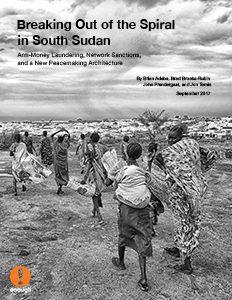 Click here to download this activist brief as a PDF.
Click here to download this activist brief as a PDF.
The metastasizing crisis in South Sudan requires a new strategy for achieving a sustainable peace. Conditions on the ground are unbearable for large swathes of South Sudan’s population, and regional peacemaking efforts are not delivering results. Absent any new variables, the parties to South Sudan’s war, particularly the government, lack sufficient incentives to make the necessary compromises for peace. Since an outright victory by any party does not seem realistic in the short run, the variable that actually could alter the parties’ incentive structure is much more effective, focused, and meaningful international pressure.
International partners should support these U.S. policy measures and take additional steps to build up the leverage required to change calculations made by South Sudanese political and military leaders who are responsible for violence and profit from grand corruption. Until just recently, the international community had imposed only half-hearted sanctions on a few individual mid-level and upper-level military commanders, with little effort expended to enforce the sanctions or to go after the broader networks that are funding the war and profit from corruption. Such individual sanctions by themselves are inadequate in shifting the calculations of abusive leaders and countering the violent kleptocratic system as a whole. The levying and enforcement of network sanctions of the sort that the U.S. government has just announced, especially if backed up by strong enforcement and more aggressive international anti-money laundering measures, could undermine the abilities of leaders and enablers to move illicit funds through the international banking system. Peace efforts for South Sudan are unlikely to succeed, and there should be no expectation that the war will be resolved, until those who profit from state capture face serious financial and political costs.
The U.S. Treasury Department’s Office of Foreign Assets Control (OFAC) recently announced new sanctions designations for three South Sudanese individuals and three related companies associated with destabilizing South Sudan.[1] This is a critical step forward, as is the new advisory from the U.S. Treasury Department’s Financial Crimes Enforcement Network (FinCEN) alerting financial institutions to the risk of potential movement of assets of South Sudanese Politically Exposed Persons (PEPs).[1] These welcome and promising developments are a positive step toward countering conflict financing in South Sudan. But much more should be done.
Click here to read the report.
A new peace strategy for South Sudan should be built around two pillars:
Pillar 1. The continued and expanded use of financial tools to build leverage
Financial tools—including network sanctions, sectoral sanctions, and anti-money laundering measures—should continue to be used and expanded to build greater leverage over the South Sudanese government, armed opposition actors, and commercial partners who drive mass violence and hijack state institutions. Such financial measures can ensure that South Sudanese leaders and their networks pay a far greater price for state capture, which in turn can compel them to change their behavior. Limited pressure, such as unenforced sanctions placed on a small number of individuals, by itself, does not build the requisite leverage. Such an approach can undermine the credibility of sanctions as a policy tool. International partners should support and build on the recent U.S. policy measures that recognize this reality.
- Imposing network sanctions focused on key leaders, their business associates and facilitators, and the companies they own or control
- Implementing sectoral sanctions directed at economic sectors hijacked by elites.
- Increasing banks’ reporting requirements and collecting financial intelligence on money laundering risks
- American and European leaders can directly underscore the financial risks the Kenyan and Ugandan governments incur in allowing illicit activity within their banking systems.
- The U.S. government and international partners can urge the international anti-money laundering body to investigate money laundering from South Sudan when the body visits Uganda and Kenya in late 2017 and early 2018.
- The U.S. government and international partners can issue public statements and press releases that raise concerns about money laundering and corruption related to South Sudan.
- The U.S. government and like-minded countries can convene global and regional banks, review specific money laundering concerns related to South Sudan, remind banks of the risks these threats pose to their institutions, and commit to specific steps to counter these threats.
- The U.S. government and other countries can convene global and regional actors that are active in the construction and extractives industries sectors to highlight the risks to these sectors in South Sudan.
Pillar 2. A revised peacemaking architecture and peace approach
The peace process should be reinvigorated, as the current Agreement on the Resolution of Conflict in South Sudan (ARCSS), negotiated by the Intergovernmental Authority on Development (IGAD) and signed in August 2015, is clearly not working. The architecture of peacemaking should be revised, with the African Union and United Nations taking a more direct, hands-on role in a process that includes a broad range of South Sudanese constituents. Such participants can represent a range of different interests and grievances within the population, and not just the narrow interests of government and rebel political and military leaders. The peace process should not only include a broader range of people but also include a broader range of the issues that matter most to South Sudanese people. The peace process should also include opposition leader Riek Machar, who represents a notable constituency and should not be isolated.
- Reorganize international peace process architecture
- Ensure inclusivity in peacemaking
- Include armed groups
- Inclusivity and accountability
Click here to read the report.
Click here to download this activist brief as a PDF.

